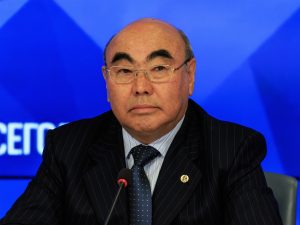Kyrgyzstan’s first president, Askar Akayev, has petitioned the country’s parliament, the Jogorku Kenesh, to restore his status as an ex-president.
Cholpon Sultanbekova, the head of the parliament’s Constitutional Committee confirmed to the media that she’d received Akayev’s letter on September 5 – it had been received by Speaker Nurlanbek Shakiyev on August 30 when the parliament was in recess.
“The issue will not immediately appear on the agenda,” she told RFE/RL’s Kyrgyz Service. “The first will be talks with factions, their leaders and deputies. After that, we will tell you on which day the issue will be put on the agenda.”
Akayev has the dual distinction of having been independent Kyrgyzstan’s first president and also its first president to be ousted in a popular revolution.
In October 1990, Akayev – at the time president of the Kyrgyz Academy of Sciences and a deputy in the Supreme Soviet of the USSR – was selected by the Kyrgyz Soviet Socialist Republic’s Supreme Soviet as a compromise candidate to fill the newly created post of president. Akayev was born in a village in northern Kyrgyzstan’s Chuy Region in 1944.
Following Kyrgyzstan’s August 31, 1991 declaration of independence, on October 13 Akayev was elected president in an uncontested poll. He was re-elected in 1995 and again in 2000. In the 2000 election, he faced off against Omurbek Tekebayev and Almazbek Atambayev. The Organization for Cooperation and Security in Europe (OSCE) which had previously dispatched an observation mission to the country’s February/March 2000 parliamentary elections, concluded after the presidential poll that “despite some positive features, [the election] failed to comply with OSCE commitments for democratic elections and failed to reverse the negative trends identified during the parliamentary elections.”
Those trends included a restrictive registration process that excluded some opposition candidates, as well as pressure exerted on monitors, media, and harassment of opposition candidates’ activities.
There were some protests in southern Kyrgyzstan after the 2000 election, but it wasn’t until after the February 2005 parliamentary elections that the drums of revolution began to sound in earnest. What was later deemed the Tulip Revolution saw Akayev pushed from power, with Kurmanbek Bakiyev – head of the People’s Movement of Kyrgyzstan electoral alliance – rising to the top of a fractured opposition. Akayev fled the country on March 24, 2005, traveling via Kazakhstan to Russia and in early April resigned. Kyrgyzstan’s parliament later stripped him of the title of “First President of Kyrgyzstan.”
After 16 years living in exile in Russia, in August 2021 Akayev returned to Kyrgyzstan for the first time to to cooperate with a State Committee for National Security (SCNS) investigation into corruption related to the Kumtor Gold Mine. Earlier in 2021, Kyrgyz authorized had moved to take control of the mine and by April 2022 had effectively nationalized it.
After a week in Kyrgyzstan, Akayev appealed to the Kyrgyz people for forgiveness and then returned to Russia. He visited Kyrgyzstana again in December 2021 for further interviews, after which an associate said that all charges against Akayev had been dropped.
In January 2023, the last criminal case pending against Akayev in relation to Kumtor was closed and the following month current Kyrgyz President Sadyr Japarov convened an extraordinary meeting in Dubai, gathering all of Kyrgyzstan’s former presidents, including Bakiyev (himself ousted in 2010) and Atambayev – who had been released from prison in Kyrgyzstan only a week earlier and allowed to leave for Spain.
With this recent history in mind, Akayev’s rehabilitation would seem to be only a matter of time.
On X, formerly Twitter, Deputy Chairman of the Cabinet of Ministers Edil Baisalov pedantically argued that “From a legal point of view, there is no doubt that Askar… continues to hold the title of ex-president of Kyrgyzstan.” In his personal view, Baisalov said, there’s no need to divert resources to debating the past.
RFE/RL’s Kyrgyz Service noted, however, that a former president can be stripped of ex-president status by parliament on the basis of a serious criminal charge. And it’s not just a rhetorical matter.
As 24.kg reports, if Akayev’s status as an “ex-president” is indeed restored, he would receive benefits under the country’s law “On guarantees of the activities of the President and the status of the former President of the Kyrgyz Republic,” including complete immunity from criminal prosecution for acts committed while in office, as well as the provision of a monthly allowance, state security, and free medical care. He would also be provided a state dacha. After his death, his relatives would inherit his monthly allowance.
At present, only two of Kyrgyzstan’s five former presidents enjoy the privileges of “ex-president” status: Roza Otunbayeva and Sooronbay Jeenbekov. Akayev, Bakiyev, and Atambayev do not.
24.kg polled parliamentary deputies for their opinions in the matter (and is running a public poll too). Most seemed cautious, having just learned of Akayev’s petition. Iskhak Masaliev, head of the Butun, Kyrgyzstan faction suggested that Japarov could simply grant ex-president status to Akayev but stated that he was “categorically against it.” Marlen Mamataliev, a deputy of the Yntymak faction, argued that Akayev “hasn’t done enough for the country” and suggested that Akayev first open at least “two plants in seven regions.” Others, including outspoken deputy Dastan Bekeshev, cited the costs associated with granting the privileges of an ex-president and highlighted Akayev’s role in Kyrgyzstan’s economic troubles.

































